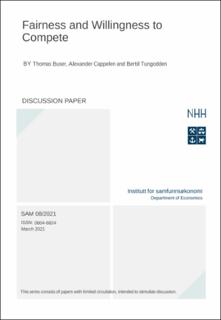| dc.description.abstract | The large experimental literature on competitiveness has typically ignored a key feature of many competitive settings in society: competition is not always fair. The playing field may be uneven and competitors of unequal strength. In our experiment, we systematically vary the fairness of the competition setting. We find that concerns for the chance of winning trump concerns for fairness for most, but not all, people. A majority of participants who compete under fair circumstances are willing to impose competition on opponents who have been exogenously handicapped or are known to be weaker. A majority are also willing to sabotage the performance of their opponent to increase their own chances of winning. However, a large minority do not exploit the costless opportunity to sabotage the performance of their opponent, suggesting at least some concerns for fairness. Our results are relevant for management practices, in particular for the decision to introduce competitive mechanisms in businesses and organizations. By studying gender differences under a range of novel competitive settings, we also shed new light on the much-discussed gender difference in willingness to compete. | en_US |
